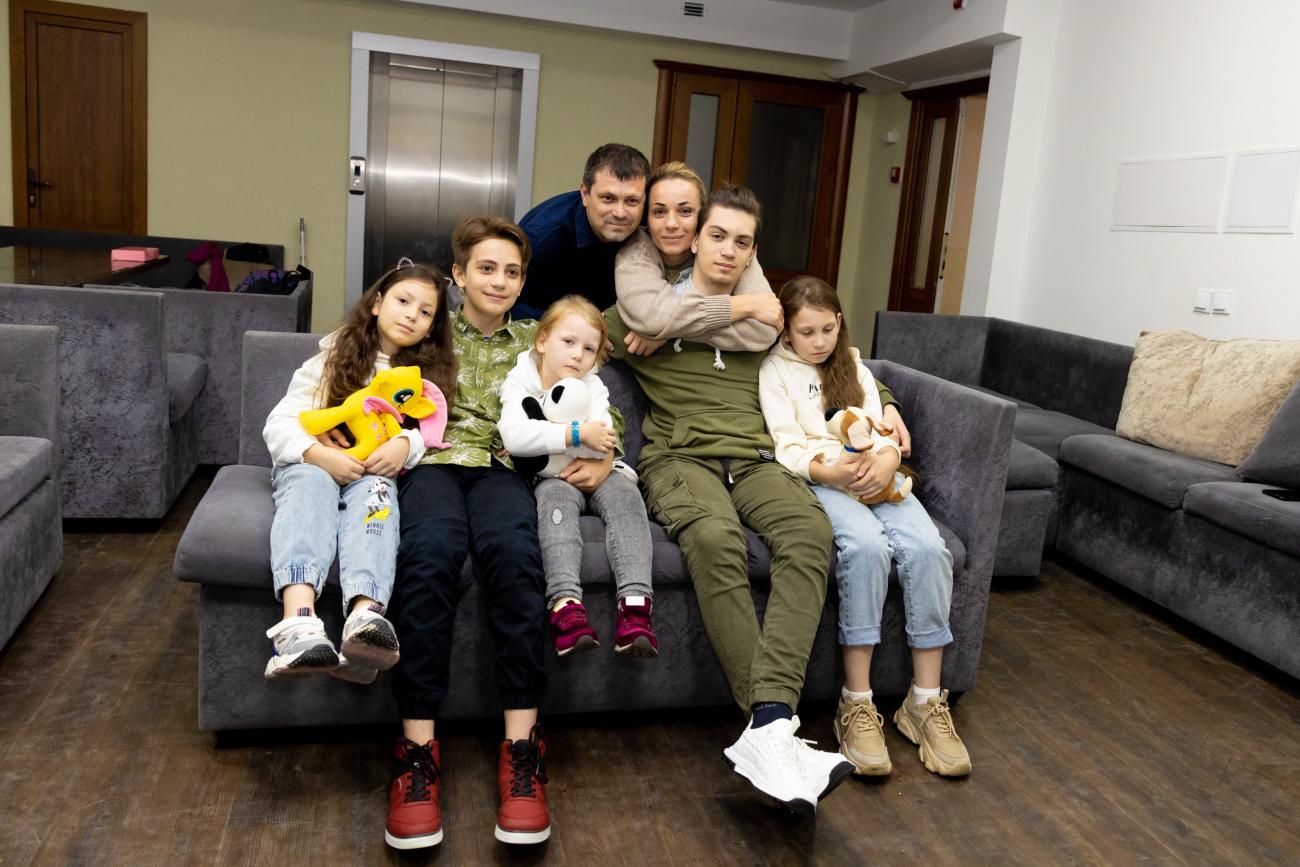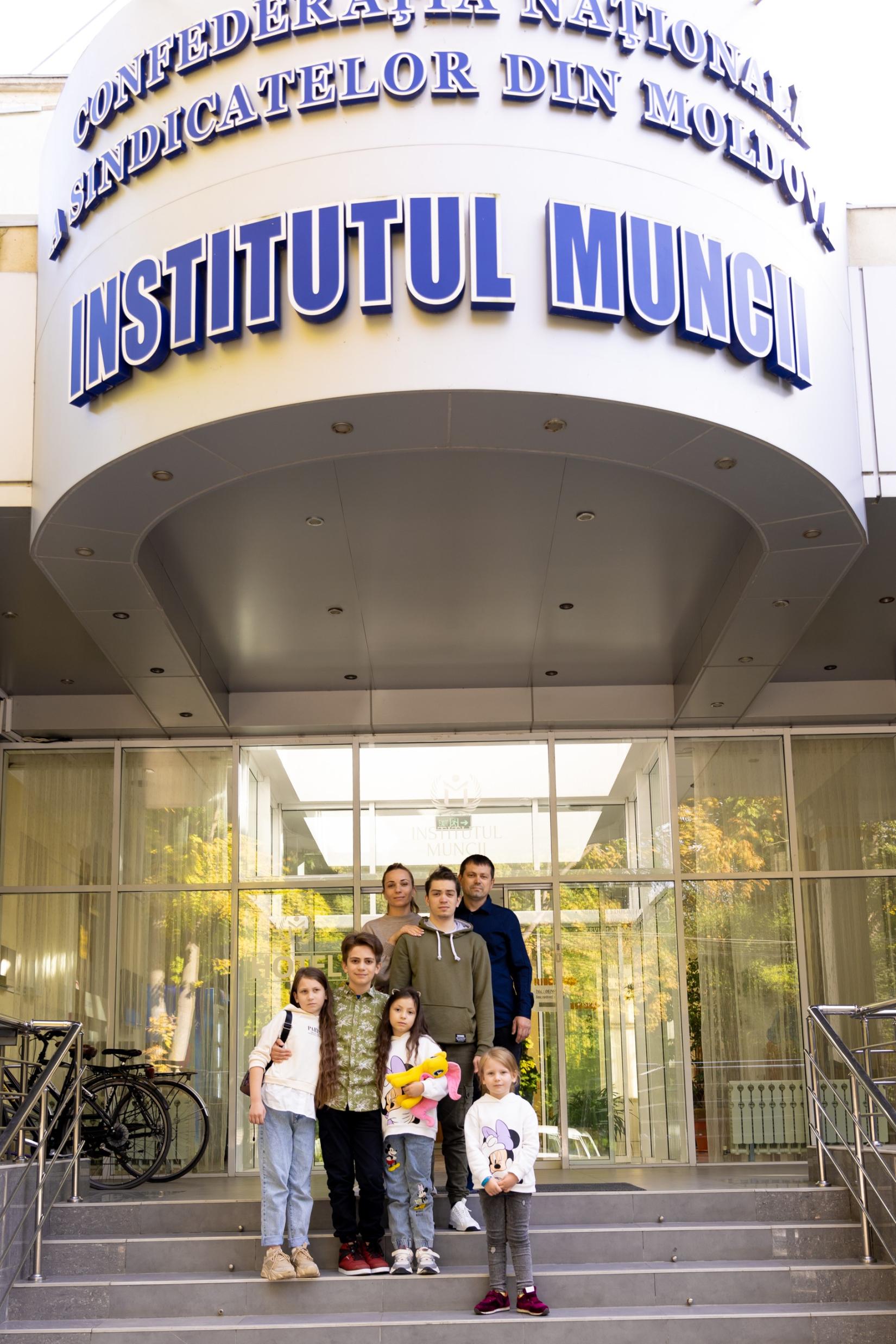From desperation to hope: the story of Rada and Iurii Bigun, a refugee family for whom Moldova has become more than a place of refuge

With ILO support, Moldova’s trade unions have warmly received and supported hundreds of refugees arriving from Ukraine.
The National Confederation of Trade Unions of Moldova (CNSM) is making use of its properties, both the Institute of Labour in Chisinau and sanatoriums east of the capital, to house individuals and families. So far, roughly 3550 bed-nights have been provided.
Like most Ukrainians, Rada and Iurii woke early Thursday morning to the sounds of war….
“Explosions and car sirens made our blood freeze” – recalls Iurii. “We quickly learned from the news about Russia’s invasion of Ukraine. A war nowadays??? At first, we could not believe our ears. Yet, we had to believe our eyes. Fear and panic were everywhere, in long queues at ATMs, in grocery stores to stock up on food, in endless lines at the bus and train stations.”
At the beginning they did not know where to hide. Soon, the basement of their apartment block became their second home. For nearly two weeks Rada, Iurii and their five children shared the “new house” with tens of people.
“The shelling of Kiev intensified. We knew we must leave but we had no place to go” – Rada’s voice is shaking. “With five kids, moving wasn’t an easy choice”. They decided to go to Rada’s mother in Kirovograd, a location in the heart of Ukraine. Two grown-ups and five kids squeezed their lives into a couple of backpacks and hit the road. Their exodus was slowed by massive traffic jams of cars filled with families desperate to leave Kiev.
For several weeks they felt safe in Kirovograd, but then the war moved closer. By mid-summer Russian strikes had killed tens of people and wounded hundreds more in the region. The family realized that they had to move again.
This time they aimed for Moldova, Ukraine’s neighbour to the South. Rada is Moldovan by birth. Her parents moved to Ukraine when she was a baby, and they lost their ties with the country. So, Moldova was entirely unknown to Rada, as was its language.
“We made our way towards the border, an unforgettable journey”, Rada closes her eyes. “Abandoned cars and personal belongings, all dropped in a hurry, flanked the road on either side. When faced with death, people decided they needed little. I saw women striding to reach the border with babies glued to their breasts, sobbing children, and lost-in-thought elders faltering behind. My heart ached for them. But I also saw hope in many eyes … hope for a place free of war beyond the border”.
Over half a million people are estimated to have fled to Moldova from Ukraine since the start of the war, on 24 February 2022. The country has the largest ratio of refugees to population. At the peak of the inflow, the population grew by 4 percent. So far, nearly 90,000 refugees have chosen to remain in Moldova. They have been provided with social welfare payments, access to housing, medical treatment and schools.

“In Chisinau we ended up at the Institute of Labour” – Iurii recalls. “This was our luckiest day ever. We’ve been provided with two rooms, great for our large family. We’ve spent nearly three months here. We are very grateful to the leadership of the institute and to all those behind this project for their compassion and understanding.”
“The Institute of Labour is the training arm of CNSM” – explains Viorel Blaga, the general director. “We have reserved a good number of rooms in our hotel, so we can host as many refugees as possible. We provide people with three meals a day. We’ve created an information desk, a laundry room, a room where children can play, and even a family fitness room. Refugees have free access to internet, among other things.”
A life divided into “before” and “after”
Just before the war Rada and Iurii thought they were on the right track in life. The large family was provided with social housing, after many years of sharing a tiny apartment with Iurii’s parents. The two-room flat become their home, the most precious thing they ever had. Rada and Iurii obtained a loan from a local bank, they renovated the flat and put little money aside to furnish it. Iurii is a skilled auto mechanic, this was of great help to the large family. Rada was never employed. Taking care of children was her main duty. “We planned for three but ended up with five” – Rada’s smile is shy. “Household chores consumed all my time, still I felt I could do more. One day, with the help of my eldest son, I put together a website. It was a call for help for my friends and their sick child who was in need of life-saving surgery. The parents could not afford it. I used the website to call on people for help, and it worked. Since then, tens of Ukrainian families with disabled children received support from local sponsors, but also from Italy and the United States. I never stopped matching those in need with good-hearted people. I do this as a volunteer”- Rada pauses for a while. “I resumed my work as soon as we arrived in Chisinau. Many people in Ukraine could not flee from war due to serious health problems, and they need support. Children need help more than anyone else, as war can result in lasting trauma for them”.
“Before leaving Ukraine, we instructed our kids to only pack essential things in their small backpacks”, - Iurii explains. “Upon the arrival we discovered they had only packed their cherished toys, an emotional connection with the childhood back home. With the start of the war, our kids spend most of the time drawing. They are painting colorful Ukrainian towns and villages. They usually add a small Ukrainian flag in the upper-right corner of the drawing. A Ukrainian flag in every town and village - this is how the war will end through the eyes of our children. This is everyone’s hope as well.”
“In times of uncertainty people do not take bold decisions, as a rule. However, we have decided to become an exception” – Rada sounds determined. “We decided to stay in Moldova for as long as necessary. Iurii is looking for a job. We are confident he will find one, we’ve just learned no work permit is required for refugees. We have been searching for an apartment to rent. I will continue my volunteer work to help people in need in Ukraine. I have started Romanian language courses as well. This way I reconnect with my country of birth. We have also been looking for a school for our children in Chisinau. I would love my kids to learn the language of my parents. They are half-Moldovans, after all”.




